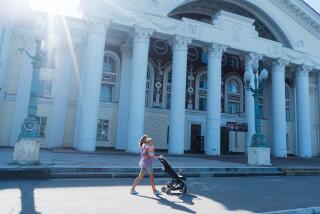Soviet Emigres in San Diego Have Little Luck Contacting Relatives
- Share via
Jewish emigre Leonard Ragomyshelsky and his family have made more than a dozen anxious telephone calls to their native Kiev since Monday, trying desperately to contact relatives living in the shadow of radioactive fallout from the Chernobyl nuclear power plant.
Ragomyshelsky, 57, has a special interest in the damaged nuclear plant. He was a geologist in the Soviet Union and worked on the Chernobyl plant before emigrating with his family to the United States 10 years ago. The tall, slightly-built Ragomyshelsky said that he worked in 1968 with a group of geologists and engineers who helped design and install the telephone and high-voltage lines that connect the plant with Kiev.
“I tried last night (Thursday) and the operator told me to call again this morning (Friday),” said Ragomyshelsky’s wife, Rachel, also 57. “Well, I called again at 5:40 this morning and the operator said there were no lines available and to try again in 12 hours.”
The Ragomyshelskys, including sons Michael, 32, and Edward, 25, own a jewelry store on El Cajon Boulevard. Despite the nuclear disaster in the Soviet Union, Ragomyshelsky expressed no reservations about the safety of nuclear power. When he lived in Kiev, Ragomyshelsky said that he worried about the Chernobyl plant “about as much as I worry about San Onofre (Nuclear Power Plant) as I pass it on my way to Los Angeles.”
Nevertheless, the family is anxiously awaiting word from relatives in Kiev. Mrs. Ragomyshelsky said her 60-year-old brother, a paralyzed World War II veteran living on a small government pension, is her only living immediate relative.
“His birthday was on May 1. He told me in the last letter that I got from him to call him on his birthday,” she said. “I want to wish him a happy birthday but, more importantly, I want to find out how he is. Letters take too long.”
But getting a letter from Kiev in the coming weeks may be impossible. According to Inessa Weintraub, another Soviet emigre in San Diego, emigres who have been able to contact relatives in Kiev were told that Soviet authorities will not permit any letters to the West from Kiev for the next three months.
“My mother learned this from a friend who called (Kiev). It’s terrible. The (Russian) community here is anxiously waiting to talk to their relatives to see if they’re all right, and it appears that the (Soviet) government is not telling the people anything about the accident. But that’s not unusual in the Soviet Union,” said Weintraub.
Weintraub, 34, came to the United States from Moscow nine years ago. Her parents also live in San Diego, while a brother remains in Moscow. According to Weintraub, some residents of the Black Sea port of Odessa, located about 375 miles south of Kiev, were not aware of the nuclear accident until told by relatives in San Diego.
“Two people I know called their relatives in Odessa on Tuesday to see if they were all right. The relatives didn’t know what they were talking about and were surprised to learn about the accident,” said Weintraub.
Ragomyshelsky said he thought the U.S. media and government have overstated the facts about the incident.
“It is a very bad accident because of the release of radioactive particles. But I disagree with the U.S. media reports that say that Kiev’s water supply has been affected. That’s not true,” he said.
The couple said that other Soviet emigres living in Southern California have also been unable to call relatives living in Kiev and other Ukrainian cities. They said that the network of Ukrainians living throughout Southern California are in frequent contact with each other, asking for any bits of information from their homeland.
Ragomyshelsky said that he tries to calm some of their fears with a little humor by interjecting the name of a Russian river which flows near the damaged plant and is a popular summer recreation area.
“Everybody’s afraid and concerned about their relatives. But I tell them, ‘Don’t be afraid. If they don’t swim in or drink water from the Dnieper River, they’ll be OK,’ ” he said.
More to Read
Sign up for Essential California
The most important California stories and recommendations in your inbox every morning.
You may occasionally receive promotional content from the Los Angeles Times.













